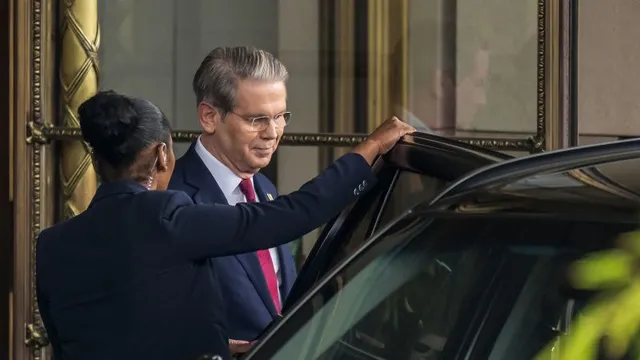
U.S. and China engage in critical trade talks in Switzerland
2025-05-10 19:03- U.S. Treasury Secretary Scott Bessent and Trade Representative Jamieson Greer are meeting with Chinese officials this weekend.
- These discussions in Switzerland emerge following a surge in tariffs, which has sharply reduced trade between both nations.
- The aim of the talks is to de-escalate tensions and potentially outline the framework for future trade relations.
Express your sentiment!
Insights
In Switzerland, high-level trade talks between the United States and China are underway this weekend, marking a pivotal moment in ongoing tensions. Scheduled meetings involve U.S. Treasury Secretary Scott Bessent and U.S. Trade Representative Jamieson Greer, representing America, alongside China's Vice Premier He Lifeng. The discussions come in the wake of a rapidly escalating trade war prompted by President Donald Trump’s significant increase of tariffs on Chinese imports, which climbed to a staggering minimum of 145%. In retaliation, China has imposed its own tariffs on U.S. goods, amounting to around 125%. The economic impacts have been severe for both nations, with trade volumes declining sharply and both economies facing downturns. The U.S. is hoping to reduce these tensions and potentially pave the way for a broader deal, though Bessent has warned expectations should remain modest, focusing on de-escalation rather than immediate large agreements. Furthermore, it appears the economic climate has compelled both nations to reassess their positions in light of adverse economic consequences. As China advocates for respect and equality in negotiations, the U.S. insists it possesses leverage in trade discussions as a crucial market for Chinese exports. Therefore, these talks not only symbolize an effort to mend relationships but reflect underlying tensions that could reshape global trade dynamics moving forward.
Contexts
The history of US-China trade relations is a complex and multifaceted narrative that reflects both economic interdependence and geopolitical tensions. The roots of this relationship trace back to the late 18th century when American merchants began trading with China, primarily exporting ginseng and importing tea and silk. The first formal diplomatic engagement occurred in 1844 with the Treaty of Wangxia, which granted American traders protections and opened ports for trade. Throughout the 19th century, commercial ties slowly developed, but they were often overshadowed by significant political and military conflicts, including the Opium Wars and the Boxer Rebellion, which impacted China’s sovereignty and its commercial landscape. After the establishment of the People’s Republic of China in 1949, trade relations effectively ended due to the Cold War, as China aligned with the Soviet Union and the US supported Taiwan. This situation began to shift in the 1970s under President Nixon’s administration, leading to a re-engagement with China through diplomatic normalization in 1979. The subsequent decade saw the implementation of market-oriented reforms in China introduced by Deng Xiaoping, which opened the country to foreign businesses and entered the US into a significant trade relationship with China. As China emerged as a manufacturing powerhouse, the US benefited from low-cost goods, leading to a considerable trade deficit, which would become a focal point of contention in bilateral relations. In the 21st century, trade between the US and China grew exponentially, becoming increasingly intertwined with global supply chains. China joined the World Trade Organization (WTO) in 2001, further solidifying its trade status and increasing its economic influence. However, rising concerns regarding China's trade practices, including intellectual property theft, currency manipulation, and lax environmental regulations, generated substantial backlash in the US. These concerns culminated in the trade tensions that emerged in 2018 when tariffs were imposed by both nations, leading to a trade war that disrupted markets worldwide and prompted debates on fairness and reciprocity in trade. Despite the trade war, which saw fluctuating tariffs and retaliatory measures, both nations continue to rely on each other. In a world grappling with a pandemic and geopolitical instability, the necessity for cooperation in trade has come to the forefront, highlighting the delicate balancing act that characterizes US-China economic relations. Moving forward, potential resolutions will require addressing underlying trade imbalances, negotiating fair practices, and fostering mutual respect to ensure sustainable trade relations for the future.